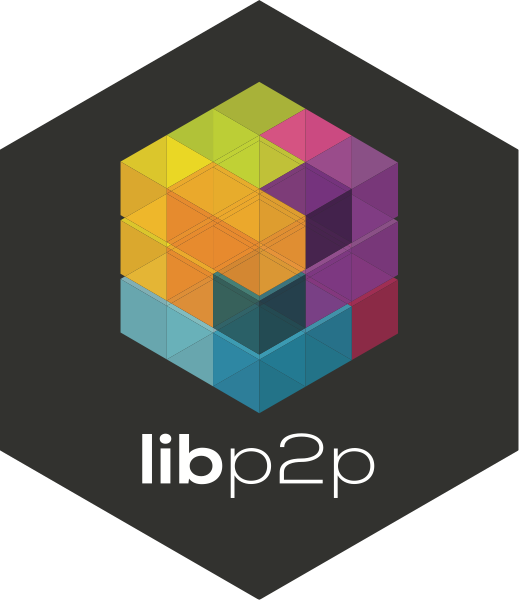Top Related Projects
IPFS implementation in JavaScript
Matrix Client-Server SDK for JavaScript
⚡️ Streaming torrent client for the web
Quick Overview
js-libp2p is a modular peer-to-peer networking stack written in JavaScript. It provides a flexible framework for building distributed applications and services, offering features like peer discovery, connection establishment, and protocol multiplexing. js-libp2p is designed to be used in both Node.js and browser environments.
Pros
- Highly modular and extensible architecture
- Cross-platform compatibility (Node.js and browser)
- Rich ecosystem of plugins and protocols
- Active development and community support
Cons
- Learning curve for newcomers due to its modular nature
- Documentation can be overwhelming for beginners
- Performance may not match native implementations in some scenarios
- Rapid development can lead to breaking changes between versions
Code Examples
- Creating a basic libp2p node:
import { createLibp2p } from 'libp2p'
import { TCP } from '@libp2p/tcp'
import { Noise } from '@chainsafe/libp2p-noise'
import { Mplex } from '@libp2p/mplex'
const node = await createLibp2p({
addresses: {
listen: ['/ip4/0.0.0.0/tcp/0']
},
transports: [new TCP()],
connectionEncryption: [new Noise()],
streamMuxers: [new Mplex()]
})
await node.start()
console.log('libp2p node started')
- Discovering and connecting to peers:
import { createLibp2p } from 'libp2p'
import { MulticastDNS } from '@libp2p/mdns'
const node = await createLibp2p({
// ... other options
peerDiscovery: [new MulticastDNS()]
})
node.addEventListener('peer:discovery', (evt) => {
console.log('Discovered:', evt.detail.id.toString())
node.dial(evt.detail.id).catch(console.error)
})
await node.start()
- Implementing a simple protocol:
import { createLibp2p } from 'libp2p'
import { pipe } from 'it-pipe'
const node = await createLibp2p({
// ... other options
})
await node.handle('/echo/1.0.0', ({ stream }) => {
pipe(
stream,
async function* (source) {
for await (const msg of source) {
yield msg
}
},
stream
)
})
await node.start()
Getting Started
To get started with js-libp2p:
-
Install the package:
npm install libp2p -
Create a basic node (see the first code example above).
-
Add desired modules (e.g., transports, peer discovery mechanisms).
-
Implement your application logic using libp2p's APIs.
-
Start the node and handle events as needed.
Refer to the official documentation for more detailed instructions and advanced usage.
Competitor Comparisons
IPFS implementation in JavaScript
Pros of js-ipfs
- Provides a complete IPFS implementation, including content addressing and distributed file system functionality
- Offers a higher-level abstraction for decentralized applications
- Includes built-in support for file storage, retrieval, and sharing
Cons of js-ipfs
- Larger codebase and potentially higher resource usage due to full IPFS implementation
- May include unnecessary features for projects that only require networking capabilities
- Steeper learning curve for developers who only need basic peer-to-peer functionality
Code Comparison
js-ipfs:
import { create } from 'ipfs-core'
const ipfs = await create()
const cid = await ipfs.add('Hello, IPFS!')
console.log('Added file:', cid.toString())
js-libp2p:
import { createLibp2p } from 'libp2p'
import { TCP } from '@libp2p/tcp'
const node = await createLibp2p({
transports: [new TCP()]
})
await node.start()
js-libp2p focuses on providing a modular networking stack, while js-ipfs builds upon libp2p to offer a complete IPFS implementation. js-libp2p is more suitable for projects requiring custom peer-to-peer networking, whereas js-ipfs is ideal for applications needing full IPFS functionality.
Matrix Client-Server SDK for JavaScript
Pros of matrix-js-sdk
- Focused on real-time communication and messaging
- Extensive documentation and API reference
- Strong community support and active development
Cons of matrix-js-sdk
- Limited to Matrix protocol, less flexible for other use cases
- Heavier dependency footprint
- Steeper learning curve for developers new to Matrix
Code Comparison
matrix-js-sdk:
const client = sdk.createClient({
baseUrl: "https://matrix.org",
accessToken: "YOUR_ACCESS_TOKEN",
userId: "@alice:matrix.org"
});
client.sendMessage("!roomId:matrix.org", {
msgtype: "m.text",
body: "Hello, World!"
});
js-libp2p:
const node = await Libp2p.create({
addresses: { listen: ['/ip4/0.0.0.0/tcp/0'] },
modules: { transport: [TCP], connEncryption: [NOISE], streamMuxer: [MPLEX] }
});
await node.start();
node.on('peer:discovery', (peerId) => {
console.log('Discovered:', peerId.toB58String())
});
The matrix-js-sdk code focuses on sending messages within the Matrix ecosystem, while js-libp2p demonstrates peer discovery and network configuration for a more general-purpose, decentralized networking approach.
⚡️ Streaming torrent client for the web
Pros of WebTorrent
- Specialized for browser-based torrent streaming and file sharing
- Simpler API for quick implementation of torrent functionality
- Built-in support for WebRTC, enabling peer-to-peer connections in browsers
Cons of WebTorrent
- Limited to WebRTC and WebSockets, reducing flexibility in network protocols
- Focused primarily on torrents, less versatile for other P2P applications
- Smaller community and ecosystem compared to js-libp2p
Code Comparison
WebTorrent:
const WebTorrent = require('webtorrent')
const client = new WebTorrent()
client.add(torrentId, (torrent) => {
torrent.files.forEach(file => file.appendTo('body'))
})
js-libp2p:
const Libp2p = require('libp2p')
const node = await Libp2p.create({
addresses: { listen: ['/ip4/0.0.0.0/tcp/0'] },
modules: { transport: [TCP], connEncryption: [NOISE], streamMuxer: [MPLEX] }
})
await node.start()
While WebTorrent provides a straightforward API for torrent-specific operations, js-libp2p offers a more flexible and modular approach for building various P2P applications. js-libp2p supports a wider range of protocols and transport layers, making it more suitable for complex P2P systems beyond file sharing.
Convert  designs to code with AI
designs to code with AI

Introducing Visual Copilot: A new AI model to turn Figma designs to high quality code using your components.
Try Visual CopilotREADME
The JavaScript implementation of the libp2p Networking Stack
[!NOTE] Are you trying to upgrade libp2p to the latest version? Check out the migration guides for any changes you need to make.
Project status
This project has been used in production for years in Ethereum, IPFS, and more. It is actively maintained by multiple organizations and continues to be improved! The API might change, but we strictly follow semver.
The documentation in the main branch may contain changes from a pre-release.
If you are looking for the documentation of the latest release, you can view the latest release on npm, or select the tag in github that matches the version you are looking for.
[!TIP] Just trying to figure out what this is all about? Check our GETTING_STARTED.md guide and examples.
Background
libp2p is the product of a long and arduous quest to understand the evolution of the Internet networking stack. In order to build P2P applications, devs have long had to make custom ad-hoc solutions to fit their needs, sometimes making some hard assumptions about their runtimes and the state of the network at the time of their development. Today, looking back more than 20 years, we see a clear pattern in the types of mechanisms built around the Internet Protocol, IP, which can be found throughout many layers of the OSI layer system, libp2p distils these mechanisms into flat categories and defines clear interfaces that once exposed, enable other protocols and applications to use and swap them, enabling upgradability and adaptability for the runtime, without breaking the API.
We are in the process of writing better documentation, blog posts, tutorials and a formal specification. Today you can find:
- libp2p.io
- docs.libp2p.io
- Specification (WIP)
- Discussion Forums
- Talks
- Articles
To sum up, libp2p is a "network stack" -- a protocol suite -- that cleanly separates concerns, and enables sophisticated applications to only use the protocols they absolutely need, without giving up interoperability and upgradability. libp2p grew out of IPFS, but it is built so that lots of people can use it, for lots of different projects.
Roadmap
The js-libp2p roadmap can be found here: https://github.com/libp2p/js-libp2p/blob/main/ROADMAP.md
It represents current projects the js-libp2p maintainers are focused on and provides an estimation of completion targets.
Install
npm install libp2p
Usage
Configuration
For all the information on how you can configure libp2p see CONFIGURATION.md.
Limits
For help configuring your node to resist malicious network peers, see LIMITS.md
Getting started
If you are starting your journey with js-libp2p, read the GETTING_STARTED.md guide.
Tutorials and Examples
You can find multiple examples on the examples repo that will guide you through using libp2p for several scenarios.
Structure
/docDocs for libp2p/interopMultidimensional Interop Test/packages/cryptoCrypto primitives for libp2p/packages/interfaceThe interface implemented by a libp2p node/packages/interface-compliance-testsCompliance tests for JS libp2p interfaces/packages/interface-internalInterfaces implemented by internal libp2p components/packages/kad-dhtJavaScript implementation of the Kad-DHT for libp2p/packages/keychainKey management and cryptographically protected messages/packages/libp2pJavaScript implementation of libp2p, a modular peer to peer network stack/packages/loggerA logging component for use in js-libp2p modules/packages/metrics-prometheusCollect libp2p metrics for scraping by Prometheus or Graphana/packages/multistream-selectJavaScript implementation of multistream-select/packages/peer-collectionsStores values against a peer id/packages/peer-discovery-bootstrapPeer discovery via a list of bootstrap peers/packages/peer-discovery-mdnsNode.js libp2p mDNS discovery implementation for peer discovery/packages/peer-idImplementation of @libp2p/interface-peer-id/packages/peer-recordUsed to transfer signed peer data across the network/packages/peer-storeStores information about peers libp2p knows on the network/packages/protocol-echoImplementation of an Echo protocol/packages/protocol-perfImplementation of the Perf protocol/packages/pubsublibp2p pubsub base class/packages/floodsublibp2p-floodsub, also known as pubsub-flood or just dumbsub, this implementation of pubsub focused on delivering an API for Publish/Subscribe, but with no CastTree Forming (it just floods the network)./packages/recordlibp2p record implementation/packages/stream-multiplexer-mplexJavaScript implementation of https://github.com/libp2p/mplex/packages/transport-tcpA TCP transport for libp2p/packages/transport-webrtcA libp2p transport using WebRTC connections/packages/transport-websocketsJavaScript implementation of the WebSockets module that libp2p uses and that implements the interface-transport spec/packages/transport-webtransportJavaScript implementation of the WebTransport module that libp2p uses and that implements the interface-transport spec/packages/utilsPackage to aggregate shared logic and dependencies for the libp2p ecosystem
Development
Clone and install dependencies:
> git clone https://github.com/libp2p/js-libp2p.git
> cd js-libp2p
> npm install
> npm run build
Tests
Run unit tests
# run all the unit tests
> npm test
# run just Node.js tests
> npm run test:node
# run just Browser tests (Chrome)
> npm run test:chrome
Packages
List of packages currently in existence for libp2p
This table is generated using the module
package-tablewithpackage-table --data=package-list.json.
| Package | Version | Deps | CI | Coverage |
|---|---|---|---|---|
| libp2p | ||||
libp2p |  |  |  | |
@libp2p/interface |  |  |  | |
| transports | ||||
@libp2p/memory |  |  |  | |
@libp2p/tcp |  |  |  | |
@libp2p/webrtc |  |  |  | |
@libp2p/websockets |  |  |  | |
@libp2p/webtransport |  |  |  | |
| secure channels | ||||
@chainsafe/libp2p-noise |  |  |  | |
@libp2p/plaintext |  |  |  | |
@libp2p/tls |  |  |  | |
| stream multiplexers | ||||
@chainsafe/libp2p-yamux |  |  |  | |
@libp2p/mplex |  |  |  | |
| peer discovery | ||||
@libp2p/bootstrap |  |  |  | |
@libp2p/kad-dht |  |  |  | |
@libp2p/mdns |  |  |  | |
@chainsafe/discv5 |  |  |  | |
| content routing | ||||
@libp2p/http-v1-content-routing |  |  |  | |
@libp2p/delegated-content-routing |  |  |  | |
@libp2p/kad-dht |  |  |  | |
| peer routing | ||||
@libp2p/delegated-peer-routing |  |  |  | |
@libp2p/kad-dht |  |  |  | |
| utilities | ||||
@libp2p/crypto |  |  |  | |
| data types | ||||
@libp2p/peer-id |  |  |  | |
@libp2p/peer-record |  |  |  | |
| pubsub | ||||
@chainsafe/libp2p-gossipsub |  |  |  | |
@libp2p/floodsub |  |  |  |
Used by
And many others...
Contribute
See CONTRIBUTING.md.
API Docs
License
Licensed under either of
- Apache 2.0, (LICENSE-APACHE / http://www.apache.org/licenses/LICENSE-2.0)
- MIT (LICENSE-MIT / http://opensource.org/licenses/MIT)
Top Related Projects
IPFS implementation in JavaScript
Matrix Client-Server SDK for JavaScript
⚡️ Streaming torrent client for the web
Convert  designs to code with AI
designs to code with AI

Introducing Visual Copilot: A new AI model to turn Figma designs to high quality code using your components.
Try Visual Copilot









